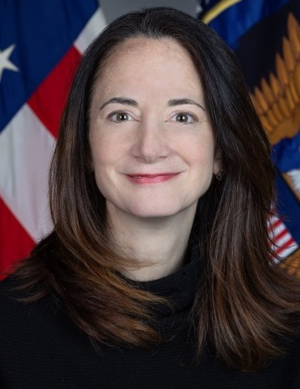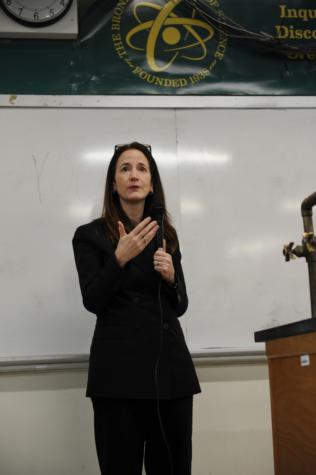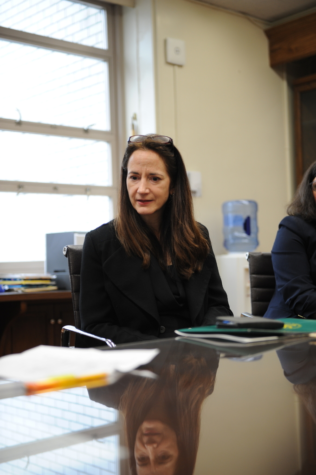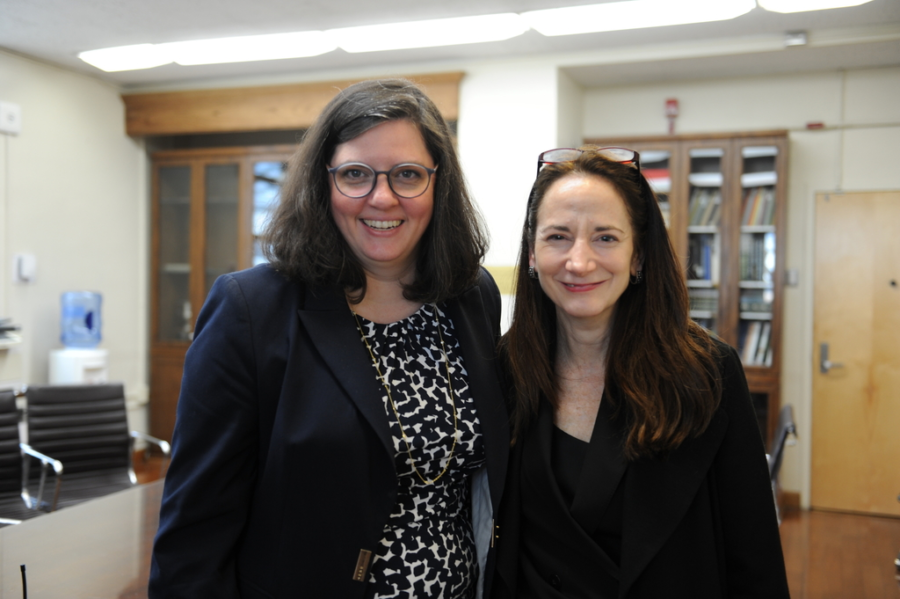Director of National Intelligence Avril Haines Visits Bronx Science
On Friday February 17th, 2023, Bronx Science had a special guest — eloquent, deeply humble, and renowned for her public service — Director of National Intelligence Avril Haines.
Director of National Intelligence Avril Haines met with Principal Hoyle on February 17th, 2023, as the two discussed the enduring legacy of Bronx Science over the years.
Bronx Science recently welcomed Avril Haines, the latest in a series of esteemed guests, to tell students about her career and provide insight into the intelligence community.
Avril Haines is the seventh Senate-confirmed Director of National Intelligence in our nation’s history and the first woman to lead the United States Intelligence Community. With an 84-10 Senate vote on January 21st, 2021, Haines assumed one of the most coveted positions in President Biden’s cabinet.
Her job as the Director of National Intelligence (DNI) entails serving as the head of the U.S. Intelligence Community, overseeing and directing the implementation of the National Intelligence Program (NIP). She also acts as the principal advisor to the president, the National Security Council, and the Homeland Security Council.
The U.S. Intelligence Community is a coalition of 18 agencies and organizations, spearheaded by the Office of the Director of National Intelligence. The Intelligence Community agencies are a part of the Executive Branch, and work both independently and collaboratively to gather and analyze the intelligence on matters regarding foreign relations and national security.
Haines’ journey to becoming the Director of National Intelligence was far from linear, exploring physics, flight, and entrepreneurship along the way. Born on August 27th, 1969 to painter Adrian Rappin and biochemist Thomas Haines, Haines grew up on the Upper West Side. When she was ten, her mother developed chronic obstructive pulmonary disease and became sick with avian tuberculosis. Haines and her father took care of Adrian in a home ICU until her death five years later. Haines’ connection with her mother shaped much of her later work.
Haines graduated from Hunter College High School and went on to study at the Kodokan, a judo institute in Tokyo during a gap year, before returning to the U.S. to enroll in the University of Chicago, where she graduated with a Bachelor of Arts in theoretical physics. There, she also repaired car engines at a mechanic shop and undertook flying lessons, where she met her future husband, David Davighi.

Haines then enrolled as a doctoral student at Johns Hopkins University before withdrawing to start an independent bookstore and café with Davighi in Fells Point, Maryland. Named Adrian’s Book Cafe after Haine’s late mother, the bookstore was filled with Adrian’s oil paintings in tribute. It won City Paper’s “Best Independent Bookstore” of 1997 and hosted literary readings, local writers, and small press publications. During this time, Haines became involved in community organizing in Fells Point, serving as the president of Fell’s Point Business Association while actively combating the gentrification of the neighborhood. However, after realizing her advocacy would be more impactful with a law degree, she sold the bookstore and applied to law school.
In 1998, Haines enrolled at Georgetown University Law Center, specializing in human rights and international law. She has since maintained a close relationship with her alma mater, frequently visiting campus and holding discussions with students. In a 2017 interview with the university, Haines encouraged several young adults to pursue public service careers.
“You may not be the next Mother Teresa or Mandela, or figure that changes the world… But frankly, all of the little pieces that you affect in the context of public service are what make history for the next generation,” said Haines.
After receiving her J.D. in 2001, Haines entered the human rights field, becoming a legal officer at the Hague Conference on Private International Law. In 2002, she became a law clerk for the United States Court of Appeals for the Sixth Circuit Judge Danny Julian Boggs. Following this, Haines worked in the Office of the Legal Adviser of the Department of State, first in the Office of Treaty Affairs and then in the Office of Political Military Affairs, forming close relationships with her colleagues.
Following her legal tenure, Haines then joined the Senate Foreign Relations Committee, Deputy Chief Counsel for the Majority Senate Democrats, where she became acquainted with the committee chairman — Biden, then a senator from Delaware. When Biden became President Barack Obama’s vice president, Haines followed him to the White House, working on the National Security Council.
Haines’ work was so highly regarded that in 2013, Obama named her to the second highest ranking position at the CIA, Deputy Director of the Central Intelligence Agency, despite having no previous experience in the agency. She became the first woman to hold the title of Deputy Director.

Despite initial doubts from her peers about her lack of experience, Haines quickly proved their speculations wrong. Subverting the status quo, through her steadfast dedication and meticulous detail, she firmly cemented herself as one of the most capable deputy directors.
She finds great meaning in monitoring and preventing exploitation and promoting justice, encountering deep intellectual satisfaction and organizational challenge in her work. She emphasized the importance of “making connections and the importance of getting critical information in front of the right person at the right time.”
After her time serving in this position, Haines went on to fulfill the role of principal deputy national security adviser in the Obama administration until President Donald Trump took over. Following the administration change, Haines transitioned back into the private sector, where she was appointed to multiple posts at Columbia University. She was a senior research scholar and Deputy Director for the Columbia World Projects, a program designed to provide academic scholarships for some of the most basic and fundamental challenges the world is facing. In May of 2020, she was designated the program’s next director.
Haines continued to maintain her relationship with Joe Biden, and, on November 23rd, 2020, he announced his nomination of Haines for the position of Director of National Intelligence. Since then, she has continued to serve as a progressive and charismatic leader for the United States Intelligence Community.
Arriving at the Bronx Science campus under the quintessential mural of famous thinkers, Haines came with thoughtful insight, focused attention, and deep passion for encouraging our education.
Immediately personable, she extensively conversed with NHS President Kaitlyn Youn and Vice President of Tutoring Hannah Nadler as they gave a tour of the school. Beginning in the physics wing, she met with Physics teacher Mr. Nicholas Zanata and observed a junior AP Physics 1 class. She then continued her visit to an Elements of Engineering lesson, where even the youngest ninth graders got to interact with Haines.

The tour continued to the Holocaust Museum, where Haines, a Jewish woman herself, learned about the Bronx Science Holocaust Leadership program, a center visited by nearly sixty thousand individuals with a myriad of original Holocaust documents and artifacts. Throughout, she asked thoughtful questions, surprised at the plethora of artifacts displayed and their origins.
She returned to Principal Hoyle’s office to delve into the root of her visit: her late mother, a Bronx Science student herself. Haines affectionately looked over a copy of her mother’s transcript and permanent record, recalling details her mother told her about her high school experience. Haines also received a handwritten letter the principal at the time, Dr. Morris Meister, had written to her mother along with other correspondence between the pair. Haines disclosed that although she had various paintings from her mother, she had little memorabilia from her mother’s background in science.
Haines was also presented with the official Bronx Science register book, which contains signatures from every famous person who has visited the campus. She joined a list of acclaimed signatories, notably including Eleanor Roosevelt, Madeleine Albright, and Justice Antonin Scalia.
Then, in a room packed to the brim with eager students, she spoke on a career in national security. With poise and conviction, she addressed the students, candidly answering questions about her life. She elaborated on the significance of public figures addressing young adults and increasing awareness about the intelligence community. She explained, “Transparency needs to be applied in government more often. It is not just a one-way street [between people and the government] but rather is a dynamic relationship.”
She admitted to the focus on “most terrible and deeply depressing subjects” that may make up national intelligence, but encouraged students to “don’t get mired and lose perspective.” Haines noted that she is constantly inspired by the innovation she sees. She said that encountering “relationships that are pretty extraordinary” amongst her work culture and the ability to “do something hopeful” motivate her to continue persevering despite challenges.
With motivating messages and eloquent words, Haines left an impression that students will not soon forget.
Despite initial doubts from her peers about her lack of experience, Haines quickly proved their speculations wrong. Subverting the status quo, through her steadfast dedication and meticulous detail, she firmly cemented herself as one of the most capable deputy directors.
Pritika Patel is an Editor-in-Chief for ‘The Science Survey.’ She believes that journalism serves as the vital connection between people and the world...
Hallel Abrams Gerber is an Editor-in-Chief for ‘The Science Survey,’ using her writing to represent a myriad of social issues and innovations, bolster...











